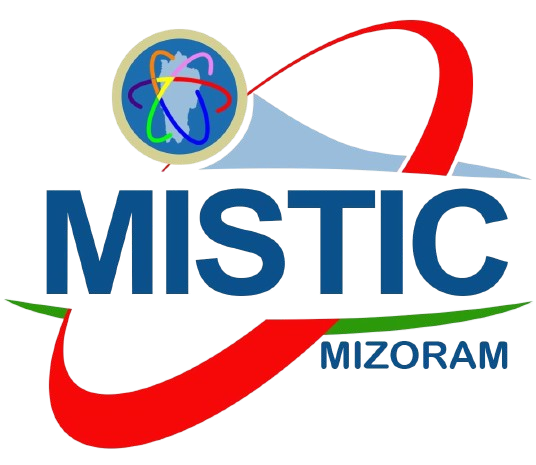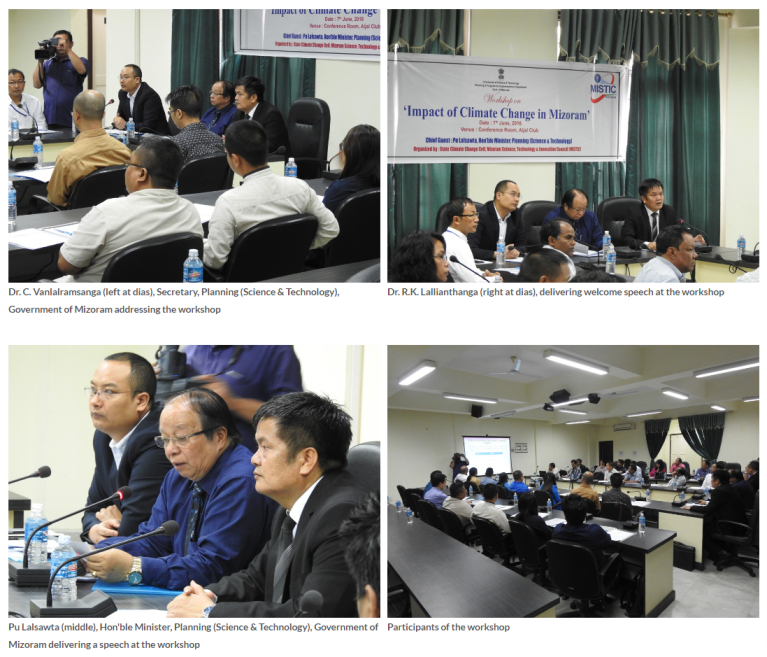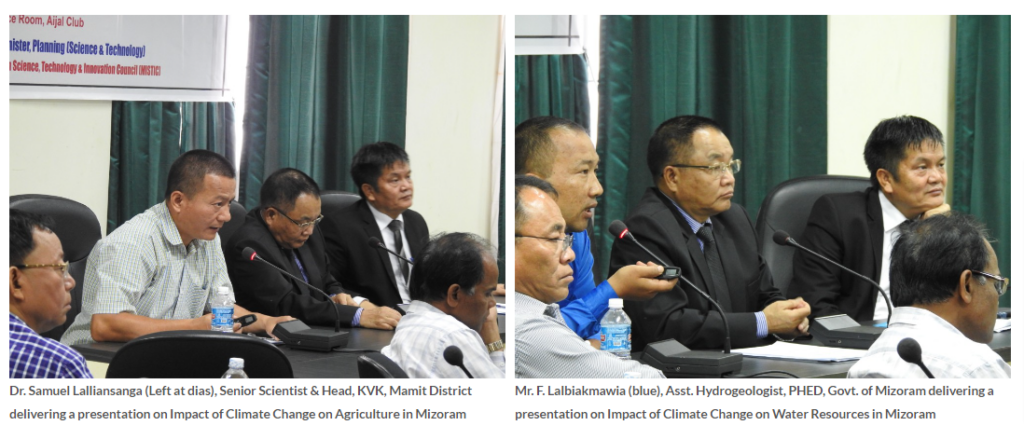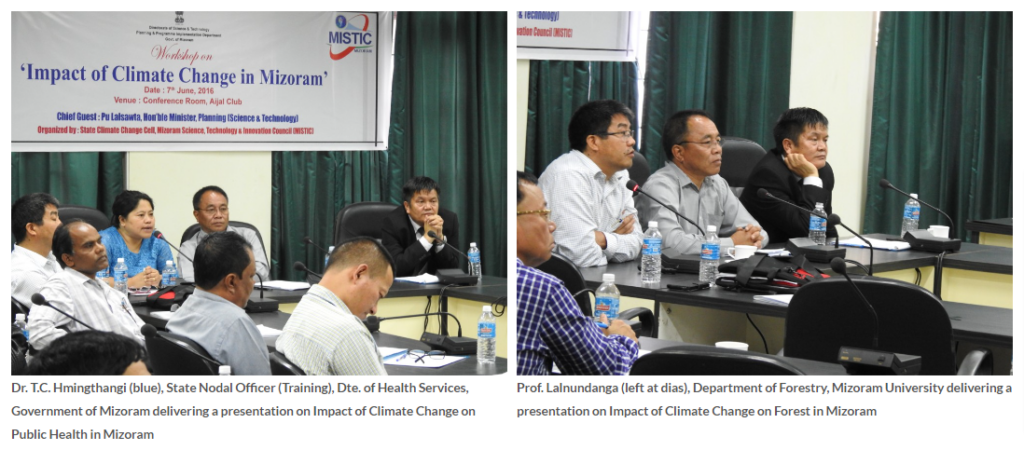STATE LEVEL WORKSHOP ON IMPACT OF CLIMATE CHANGE IN MIZORAM
Home > SCCCC > Phase I > STATE LEVEL WORKSHOP ON IMPACT OF CLIMATE CHANGE IN MIZORAM
Date: 7th June, 2016 (Tue), 10:00 A.M. – 2:00 P.M.
Venue: Conference Hall, Aijal Club, Aizawl, Mizoram
Organised By
Mizoram State Climate Change Cell
Mizoram Science, Technology and Innovation Council
BACKGROUND
As per the suggestion of the “Consultation Workshop of State of the Himalayan Region 2016 under NMSHE” on 10th – 11th March, 2016 at New Delhi organized by the Department of Science & Technology, Ministry of Science and Technology, Government of Inida, in collaboration with Swiss Agency for Development and Cooperation (SDC) and Indian Himalayas Climate Adaptation Programme (IHCAP), the State Climate Change Cell of Mizoram, under MISTIC felt the need of organizing a one day workshop on the Impact of Climate Change in Mizoram.
In tandem to this, one day workshop on the Impact of Climate Change in Mizoram was organized on 7th June 2016, A total of 38 persons from Government line departments, faculties from academic institutions within the state, NGOs and Media personnel participate in the workshop. The workshop emphasize on four sectors:
Ø Agriculture
Ø Water Resources
Ø Public Health
Ø Forest
OBJECTIVES
The basic objectives of this one day workshop include the following –
- To identify the impact of climate change in Mizoram on the four selected sectors viz., Agriculture, Health, Forest and Water resources.
- To generate baseline information for future vulnerability and risk assessment due to climate change in the state.
- This workshop aims to build the capacity of the concern Departments towards the knowledge of climate change and its related issues.
INAUGURAL PROGRAMME
The workshop was chaired by Dr. C. Vanlalramsanga, Secretary, Planning & Programme Implementation Department, Government of Mizoram. In his introductory speech, he welcomed all the participants of the workshop and gave brief insights on the purpose of organizing the meeting. Dr. R.K. Lallianthanga, CSO & Member Secy. MISTIC, gave a brief keynote address presenting the work plan and progress of the State Climate Change Cell. In his speech, he mentioned the need for coherent and active participation of Line Departments for the success of the climate change programme of the state, and further building positive approach for a stronger collaborative work for eco-friendly climate adaptation strategies in Mizoram. The workshop was then inaugurated by Pu Lalsawta, Hon’ble Minister, Planning, etc., Govt. of Mizoram. In his speech, he highlighted the importance of the need for climate studies in the state as Mizoram being an infant state, it is lacking behind in baseline data collections and analysis of such data.
REPORT ON THEME-WISE SESSIONS
The workshop proceeds with two technical sessions. The detailed report and discussions carried out for each of these technical sessions are elaborated as follows: –
Technical Session – I
The technical session – I of the workshop started at 11:10 A.M and extended up to 12:10 P.M. The session was chaired by Dr. C. Lalzarliana, Director, Agriculture (Crop Husbandry). There are two topics during this session viz., Agriculture and Water Resources which were presented by the following resource persons, followed by queries and discussions.
Impact of Climate Change on Agriculture in Mizoram
Presented by: Dr. Samuel Lalliansanga, Senior Scientist & Head, KVK, Mamit district
Highlights:
Present status of Agriculture on climate change in Mizoram.
- In this topic, it was highlighted that, 62.10% of the area under major agricultural crops is occupied by rice cultivation in Mizoram.
- From the 12 rainfall stations in Mizoram, ICAR analysis reports that during winter and post-monsoon, there has been a steady decreasing trend in rainfall pattern which increases the risk of assets damage due to uncontrolled forest fire during jhum burning (February- March).
- Excess wetness in August which may hinder harvesting of crops especially at high altitude jhum areas.
- Sharp declining trend in rabi rainfall (October to February – Post monsoon and winter) – threatening the potential of winter vegetable cultivation during rabi season.
- It was also highlighted that National Innovations on Climate Resilient Agriculture (NICRA) under ICAR is working on the climate change adaptive capacity of local farmers in Mizoram.
- A weather-based agro-advisory called ‘Gramin Krishi Mausam Sewa’ is being prepared by ICAR NEH region, in collaboration with Mizoram Centre, Kolasib which gives five (5) days weather forecast for the eight districts of the state which will be highly useful for local farmers and allied.
- Some of the emerging problems in agriculture were highlighted which are new or previously of low occurrence in the state as follows –
Ø Increase in emergence of Rice leaf roller pest
Ø Increase in emergence of Ralstonia solanacearum infecting passion fruit
Ø Blast at nursery stage in rice has been observed in 2015 in different districts of the state.
Recommendations
Need for location specific, comprehensive planning and technology dissemination to reduce the susceptibility of hill agriculture towards the present climate variability, in Mizoram.
Impact of Climate Change on Water Resources in Mizoram
Presented by: Pu F. Lalbiakmawia, Asst. Hydrogeologist, Ground Water Resources Assessment Cell, Public Health Engineering (PHE) Department, Government of Mizoram
Highlights:
Present status of Water Resources on climate change in Mizoram.
- During this topic presentation, it was highlighted that very little work has been done on the study of hydrology and climate change even at the global level, let alone for a very young state like Mizoram.
- It was also highlighted that, Mizoram Remote Sensing & Space Application Centre (MIRSAC) has generated watershed map of Mizoram, which can be very useful for water resources management in the state.
- Ground water level data is being generated by the Ground Water Resources Assessment Cell, PHE, Mizoram.
- Dynamic Ground Water Resources of Mizoram 2015, under Central Ground Water Board (CGWB) has been prepared which depicts groundwater prospects map at 1:50000 scale.
- It was stressed during this topic that, Isohyetal map at least at the watershed level, is an essential need for proper knowledge of the state’s water resources for better management and its conservations.
- It was highlighted that data on groundwater resources is still very much lacking in the state, such as –
Ø Total available groundwater resources
Ø Ground water quality
Ø Sub-surface information-Litho log
Ø Effect of anthropogenic activities on groundwater
Recommendations
- Determining the impact of climate change on water resources required research/study in watershed level
- Establishing hydrometric network
- Establishing micro weather station for monitoring climatic conditions
- Detail mapping of surface water- areal coverage & volume
- Mapping of potential sources of water supply for climate change adaptation
- Establishing groundwater monitoring station
- Ground Water potential mapping in larger scale
- Dynamic groundwater resources with relevant methodology
- Master plan for artificial recharge to groundwater
- Policy, Rules & Regulation for Water resources management
- Spring-shed development (Dhara Vikas in Sikkim)
- Water resources Information Centre
Technical Session – II
The technical session – II started at 12:30 P.M and extended to 1:30 P.M. This technical session was chaired by Pu Liandawla, Chief Wildlife Warden, Environment, Forest & Climate Change Department, Government of Mizoram. There are two topics during this session viz., Public Health and Forest which were presented by the following resource persons, followed by queries and discussions.
Impact of Climate Change on Public Health in Mizoram
Presented by: Dr. T.C. Hmingthangi, State Nodal Officer (Training), Dte. of Health Services, Government of Mizoram
Highlights:
Present status of Public Health on Climate Change in Mizoram.
- During this topic presentation, it was highlighted that due to climate change, vectors & water-borne diseases is increasing in the state.
- It was highlighted with the support of data that the incidence of malaria cases has seen a significant increase in the state since the last five years which can be mainly attributed to increase in precipitation during the monsoons.
- It was also highlighted that, dengue syndrome – an infectious disease caused by Arboviruses has been recently recorded in the state.
- Another emerging disease in the state is the Scrub Typhus, suspected to be the indirect effect of deforestation and climate change.
- Other suspected climate change related diseases (as no confirmed case exists) includes:
Ø West Nile Virus
Ø Japanese encephalitis
- During this topic, it was discussed that primary data collection in health sectors is quite adequate but lacks proper screening and analysis for further use in different studies. Such data needs to be arranged, grouped and analyzed to be used in future vulnerability studies.
- Lastly, increasing public awareness of the various health impacts of climate change was emphasized for the state of Mizoram.
Recommendations
- Have a better system of detecting when Malaria, Dengue, Scrub Typhus, Diarrhoea outbreaks may happen. This can be done by monitoring environments, such as temperatures, rainfall and humidity that would be attractive for these types of mosquito (Vector) & contamination to flourish.
- Educating the public: Letting the public know when malaria, dengue, scrub typhus outbreak is occurring and what they can do to protect themselves? For example, people should create a living environment that is not attractive to mosquito (no sitting water), dress in appropriate clothing (light colours, long sleeves) and wear insect repellent etc.
- Natural disasters response system & preparedness plans for vulnerable areas and increasing public health awareness of the various health impacts of climate change.
Impact of Climate Change on Forest in Mizoram
Presented by: Prof. Lalnundanga, Department of Forestry, Mizoram University
Highlights:
Present status of forest on Climate Change in Mizoram.
- During this topic presentation, a comparative statement of forest cover in Mizoram (1995 – 2015) abstracted from FSI State of Forest Report was mainly discussed.
- The statement analysis shows a decreasing trend in forest cover due to biotic pressure, shifting cultivation and soil erosion in the state despite the New Land Use Policy (NLUP).
- In this report analysis, alarm was raised as Mizoram contributes the highest net negative change (306 sq.km) in India.
- It was also highlighted that studies on the effect of climate change on Forest has not been done especially in the North-Eastern states of India.
- For the state of Mizoram, such research studies is not available due to lack of infrastructures and research centres though assumptions prevails on indicator of climate change on forest such as below:
Ø Orange orchard suitability has moved from low elevation to higher elevation
Ø Flourishing of Jackfruit from low elevation to higher elevation
Ø Moving of species
Ø Incidence of strong winds
Ø Irregular precipitation pattern, etc.
- In this topic, it was highlighted that Mizoram University which was recently established in 2002 is now undertaking different research projects on forest sectors which will greatly help in further studies in climate change and vulnerability assessment as given below –
Ø Distribution mapping on forest area
Ø Distribution mapping on medicinal plants
Ø Ecological Niche Modelling of canes
Recommendations
- Establishment of research-based documentation centre
- Forest growing stock variation register
- Distribution mapping of important tree species
- Identification of indicator species
- Re-think on the land use-based project
CONCLUDING SESSION
The concluding session of the workshop took place during 1:30 P.M. to 2:00 P.M. This session was chaired by Dr. R.K. Lallianthanga, Chief Scientific Officer & Member Secretary, MISTIC. The Chairman gave a brief review on what have been accomplished during the workshop and applauded special thanks on the active participation of line departments of the state.



